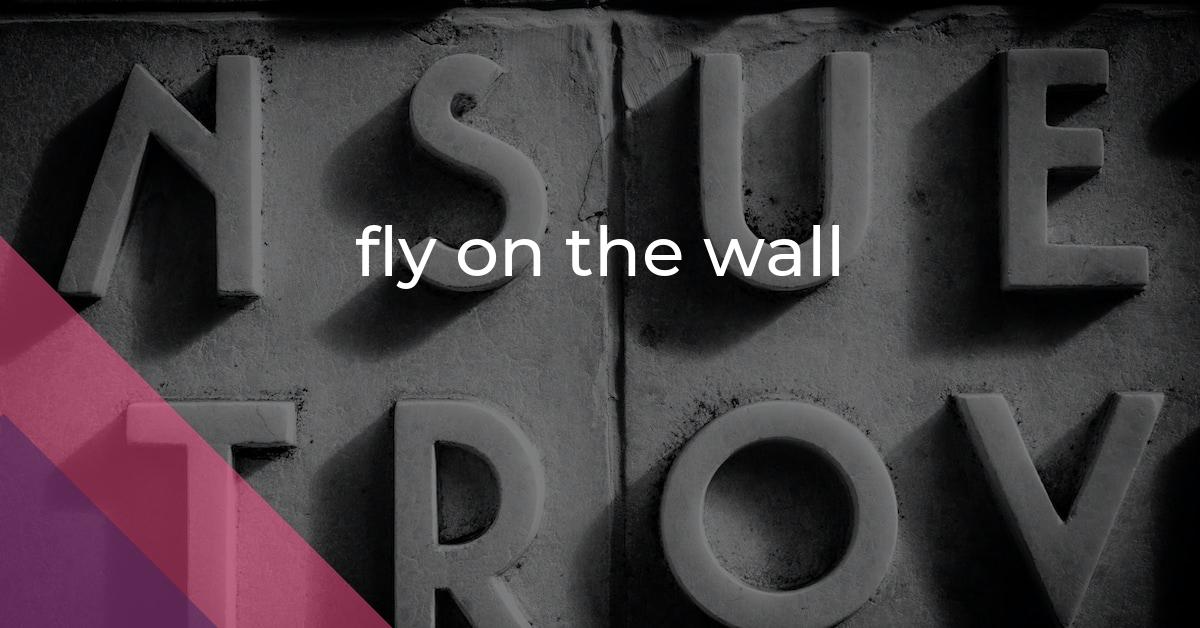fly on the wall: Idiom Meaning and Origin
What does ‘fly on the wall’ mean?
The idiom "fly on the wall" refers to being in a situation where one can observe or overhear others without them being aware of it.

Idiom Explorer
The idiom "lay eyes on" means to see or look at something. It implies that the person looking at something has a strong desire or interest in it.
The idiom "keep an eye open" means to remain alert or vigilant, to pay close attention to something or someone in order to avoid missing any important information or opportunities.
The idiom "keep an eye on" means to regularly and closely monitor or watch someone or something, usually to ensure their safety or to prevent any problems. It implies being observant and vigilant in order to maintain control or stay informed about the situation.
The idiom "in the wind" means to feel or sense that something is about to happen or change, often referring to a situation that is not yet fully known or understood.
The idiom "in someone's shoes" means to imagine oneself in someone else's position or to try to understand their thoughts, feelings, or experiences from their perspective.
The idiom "in plain sight" means something is easily visible or noticeable to everyone.
The idiom "hide in plain sight" means to conceal oneself or something in a way that is not obvious or easily noticed, even though it is in a highly visible or noticeable place.
The idiom "have eyes in the back of one's head" means to be exceptionally observant or aware of one's surroundings. It implies a heightened ability to notice things that others might miss.
The idiom "give someone the slip" means to escape or elude someone's pursuit or surveillance.
The idiom "give ear" means to listen attentively or pay close attention to something or someone.
Deciphering Intriguing Observations
The idiom "fly on the wall" is a commonly used expression in the English language. Its origins can be traced back to the mid-20th century, although it is unclear who exactly coined the phrase. The idiom refers to someone who is able to observe a situation without being noticed or actively participating. In other words, it implies being able to witness events or conversations in a discreet manner, like an unnoticed fly on a wall.
One interesting aspect of this idiom is the visual imagery it evokes. The mental image of a fly on a wall brings to mind a small, inconspicuous insect silently observing its surroundings. This imagery is key to understanding the meaning of the idiom. It emphasizes the idea of being a passive observer, unseen and unheard.
The idiom "fly under the radar" is related to the concept of being a "fly on the wall." It also involves remaining unnoticed or undetected. However, "fly under the radar" specifically refers to avoiding attention or scrutiny. It is often used to describe individuals or actions that go unnoticed or escape detection.
The idiom "fly blind" is another related phrase. It means to proceed with a task or venture without having all the information or guidance needed. It implies taking risks or making decisions without clear knowledge or understanding of the situation. While it is different from being a "fly on the wall" in terms of observation, it shares the element of navigating a situation without all the necessary information.
The idiom "fly on the wall" is often used in various contexts to describe situations where individuals wish to remain unnoticed while they observe or eavesdrop on a conversation. It is commonly used in both informal and formal settings, such as in journalism. Reporters may use the concept of being a "fly on the wall" to gather information without drawing attention to themselves. This approach allows them to obtain valuable insights and details that they may not have access to otherwise.
The idiom can also be used figuratively to express a desire to witness an event or conversation without actively participating. It conveys the idea of being an unobtrusive observer, with the ability to gather information or insights without being directly involved. This can be a powerful tool for writers, allowing them to convey the sense of curiosity and intrigue that comes with covert observation.
While the exact origins of this idiom remain uncertain, its meaning and usage have become well-established in the English language. The phrase "fly on the wall" has gained popularity and is widely understood by native English speakers. It has become a powerful metaphorical device that allows individuals to convey the desire for unobtrusive observation and the wish to gather information discreetly.
The idiom "fly under the radar" is similar to being a "fly on the wall" in the sense that it involves avoiding attention or detection. However, "fly under the radar" specifically refers to the act of not attracting notice or scrutiny. This phrase is often used to describe individuals or actions that go unnoticed or escape detection, whether intentionally or unintentionally.
When someone is "flying under the radar," they are typically operating in a low-key or inconspicuous manner. They may be deliberately trying to avoid drawing attention to themselves or their actions. This could be for various reasons, such as wanting to avoid consequences, maintain privacy, or simply keep a low profile.
Just like a "fly on the wall," someone who is "flying under the radar" is able to navigate their surroundings without attracting unwanted attention. They are able to observe and gather information without being noticed or actively participating. Both phrases convey a sense of stealth and the ability to remain unnoticed in various situations.
The idiom "fly blind" is another related phrase that shares similarities with being a "fly on the wall." However, "fly blind" refers to proceeding with a task or venture without having all the necessary information or guidance. It implies taking risks or making decisions without clear knowledge or understanding of the situation.
When someone is "flying blind," they are essentially operating without a full understanding of the circumstances or potential consequences. They may be relying on instincts, intuition, or limited information to make decisions or navigate a situation. This can be seen as a metaphorical representation of flying without the aid of instruments or navigational tools, hence the use of the word "blind."
Just like a "fly on the wall" is able to observe without actively participating, someone who is "flying blind" is proceeding without all the necessary information. Both phrases convey a sense of navigating a situation with limited knowledge or understanding, whether it be through covert observation or taking risks.
The idiom "fly on the wall" represents the desire to observe events or conversations without drawing attention to oneself. It is a widely recognized phrase in the English language, often used both literally and metaphorically. While the exact origins of the idiom may be shrouded in mystery, its usage and meaning have persisted over time, making it a valuable tool for expressing the concept of covert observation.
The idioms "fly under the radar" and "fly blind" are related to the concept of being a "fly on the wall." They both involve aspects of remaining unnoticed, either by avoiding attention or by proceeding with limited knowledge or guidance. Each idiom has its own nuances and applications, but they all speak to the human desire to navigate situations discreetly or gather information without drawing attention.
By understanding and utilizing these idioms, individuals can add depth and nuance to their language. Whether in writing or conversation, the idioms "fly on the wall," "fly under the radar," and "fly blind" provide creative ways to express the desire for unobtrusive observation, avoiding attention, or navigating situations with limited knowledge. So the next time you want to describe a situation where you wish to remain unnoticed or observe discreetly, consider using one of these idioms to enhance your expression and engage your audience.
Example usage
Examples of how the idiom *fly on the wall* can be used in a sentence:
- I wish I could be a fly on the wall during their private meeting.
- Imagine being a fly on the wall when the family received the news.
- I felt like a fly on the wall as I overheard their conversation in the coffee shop.
More "Observation" idioms



